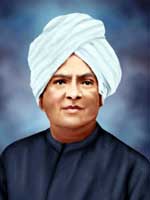Socio Political Mentors
The lack of Brotherliness is the source of all social evils and conversely the solution to all social problems lies in re-establishing brotherliness within society.

Jyothee Thass or Pandit C. Ayodhya Dasa (May 20, 1845 – 1914) was a practitioner of Siddha medicine who is regarded as a pioneer of the Dravidian Movement.Born on 20 May 1845, Thass's original name was Kaathavarayan. His grandfather has served as a butler to Lord Arlington. Kaathavarayan gained expertise in Tamil literature, philosophy, Siddha and had good knowledge of English, Sanskrit and Pali. After organising the tribal people in the Nilgris in the 1870s, he established the Advaidananda Sabha in 1876. He launched a magazine called Dravida Pandian along with Rev.
John Rathinam in 1885. He issued a statement in 1886 announcing that the so-called untouchables' are not Hindus. He established the Dravida Mahajana Sabha in 1891 and during the very first Census urged the so-called untouchables to register themselves as casteless Dravidians. This in fact makes Tamil Dalits the true descendents of the anti-Brahmin legacy which is today claimed by non-Brahmin non-Dalits.
Early life
Jyothee Thass was born Kathavarayan on May 20, 1845 in a Dalit (Paraiyar) family from Coimbatore district. His grandfather worked for Lord Arlington and little Kathavarayan profitted immensely from this association. Soon, he became an expert on Tamil literature, philosophy and indigenous medicine and could speak Tamil, English, Sanskrit and Pali.
Assumption of leadership of Dalits
In the 1870s, Jyothee Thass organized the Todas and other tribes of the Nilgiri Hills into a formidable force. In 1876, Thass established the Advaidananda Sabha and launched a magazine called Dravida Pandian in collaboration with Rev. John Rathinam.
In 1886, Thass issued a revolutionary declaration that untouchables were not Hindus. Following this declaration, he established the Dravida Mahajana Sabha in 1891. During the 1891 census, he urged Dalits to register themselves as "casteless Dravidians" instead of identifying themselves as Hindus.
Conversion to Buddhism
Jyothee Thass met Colonel H. S. Olcott with his followers and expressed a sincere desire to convert to Buddhism. According to Thass, the Paraiyars of Tamilakam were originally Buddhistsand owned the land which had later been robbed from them by aryan invaders. With Olcott's help, Thass was able to visit Ceylon and obtain diksha from the Sinhalese Buddhist monk Bikkhu Sumangala Nayake. On returning, Thass established the Sakya Buddhist Society in Madras with branches all over South India. The Sakya Buddhist Society was also known as the Indian Buddhist Association. and was established in the year 1898.
Political activism and later life
On June 19, 1907, Jyothee Thass launched a Tamil newspaper called Oru Paisa Tamizhan or One Paise Tamilian. In his later days, he was a vehement criticizer of Brahmins.
Jyothee Thass died in 1914 at the age of 69.
Legacy
Jyothee Thass remains the first recognized anti-Brahmin leader of the Madras Presidency. In many ways, Periyar, Dravidar Kazhagam, Dr. Ambedkar, Udit Raj and Thirumavalavan are inheritors of his legacy. He was also the first notable Dalit leader to embrace Buddhism.
However, Jyothee Thass was largely forgotten until recent times when the Dalit Sahitya Academy, a publishing house owned by Dalit Ezhilmalai published his writings.[4] Ezhilmalai, then the Union Health Minister, also made a desired to name the planned National Center for Siddha Research after the leader.However, the proposal did not come into effect until 2005, when vehement protests by Se. Ku. Tamilarasan of the Republican Party of India (RPI) forced the Government to take serious note of the matter.
The institute for Siddha Research was subsequently inaugurated by Indian Prime Minister Manmohan Singh on September 3, 2005 and named the Dalit leader.At its inauguration, the hospital had 120 beds.The patients were treated as per the traditional system of Siddha medicine.
Criticism
Some later critics labeled Jyothee Thass as an Anglophile, who was staunchly against the Indian freedom movement. In the early part of the 20th century, he indulged in vehement condemnation of the Swadeshi movement and the nationalist press remarking that he could "locate the power of the modern secular brahmin in the control he wielded over public opinion."
